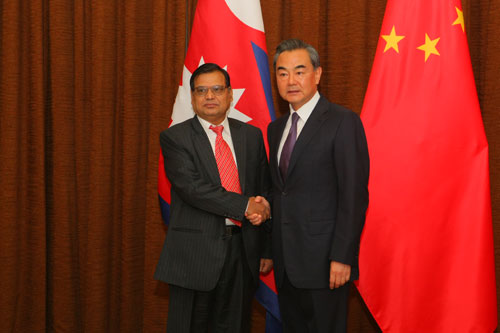 On September 7, 2017, Foreign Minister Wang Yi and Deputy Prime Minister and Foreign Minister Krishna Bahadur Mahara of Nepal met with the journalists together in Beijing after their talks.
On September 7, 2017, Foreign Minister Wang Yi and Deputy Prime Minister and Foreign Minister Krishna Bahadur Mahara of Nepal met with the journalists together in Beijing after their talks.
Wang Yi said that I had a very wonderful and extensive discussion with Foreign Minister Krishna Bahadur Mahara and reached important consensuses on further deepening China-Nepal relations. We both agreed that the development of China-Nepal relations is conducive to the intrinsic and fundamental interests of the two countries and the two peoples. The two sides will continue to view and develop China-Nepal relations from a strategic perspective and strive to elevate the friendly and comprehensive cooperative partnership between China and Nepal from generation to generation to new highs. In this course, China will adhere to the three basic principles as follows:
First, equal treatment. China has always adhered to the equality of all countries regardless of their size. So in the exchanges between China and Nepal, China will neither suppress Nepal nor interfere in Nepal’s internal affairs; China will never affiliate political conditions in bilateral economic cooperation or ask for Nepal to take sides in foreign policies.
Second, mutual support. China will continue to firmly support Nepal’s efforts in safeguarding national sovereignty and territorial integrity and strongly backup Nepal’s continuous exploration of the development path that suits its own national situation. The successive governments of Nepal have firmly adhered to the one-China policy and expressed its strong support on issues concerning China’s core interests, such as the Xi Zang issue and Taiwan problem. The Nepalese side also promised not to allow any forces to engage any anti-China activities in Nepal, for which China highly appreciates.
Third, common development. Over the years, China has attached great importance to expanding cooperation with Nepal on the basis of mutual benefit and win-win results. China welcomes Nepal to continue taking the express of China’s economic development, and is willing to strengthen cooperation with Nepal under the “Belt and Road” framework. China will also continue to provide assistance and help for Nepal in the realm of economic and social development within the due capability.
Foreign Minister Krishna Bahadur Mahara and I agreed that the “Belt and Road” initiative is a crucial opportunity for China and Nepal to strengthen mutually beneficial cooperation. The two sides should continue to deepen cooperation in various fields under the “Belt and Road” framework, and the particular focus should be rested upon the following four issues:
The first is to plan a railway. The construction of the cross-border railway between China and Nepal is a proposal of the strategic cooperation put forward by leaders of the two countries. The two sides have agreed to actively carry out project investigation, design, feasibility study, personnel training and other cooperation so as to put this idea into reality and benefit the two countries and the two peoples as soon as possible.
The second is to repair two highways, namely the Araniko Highway and the Syabrubensi-Rasuwagadi Highway. These two are traditional transit highways connecting China and Nepal, but were severely damaged in the earthquake on April 25, 2015. The two sides agreed to speed up the comprehensive repair work of the Araniko Highway and the restoration and re-opening of the Syabrubensi – Rasuwagadi Highway.
The third is to construct three border ports, namely the Zhangmu, Gyirong and Purang port. China is speeding up the geological assessment and scientific design of Zhangmu port for an early resumption and openness. The two sides have upgraded the Gyirong port to an international port and will continue to improve the facilities and functions of this port so as to construct a cross-border economic cooperation zone between China and Nepal. The two sides have agreed to improve the infrastructure of Purang port to make it give play to its linking role. The two sides will also actively study the opening of other ports.
The fourth is to deepen cooperation in the four key areas covering trade and investment, post-disaster reconstruction, energy as well as tourism. The two sides agreed to complete the joint feasibility study on the China-Nepal Free Trade Agreement within the year, to complete 17 post-disaster reconstruction projects as scheduled and with high quality and to help Nepal strengthen the capacity building of disaster prevention and mitigation. Both sides agreed to sign the memorandum of understanding on energy cooperation as soon as possible and strengthen cooperation in oil and gas, water and electricity as well as clean energy to help Nepal diversify its energy source. China and Nepal also agreed to successfully hold the “Nepal Tourism Year” in China. The Chinese side is willing to offer more convenience for Nepalese airlines to launch direct international flights between China and Nepal and Nepal will also take more measures to protect the safety and legitimate rights and interests of Chinese tourists.

